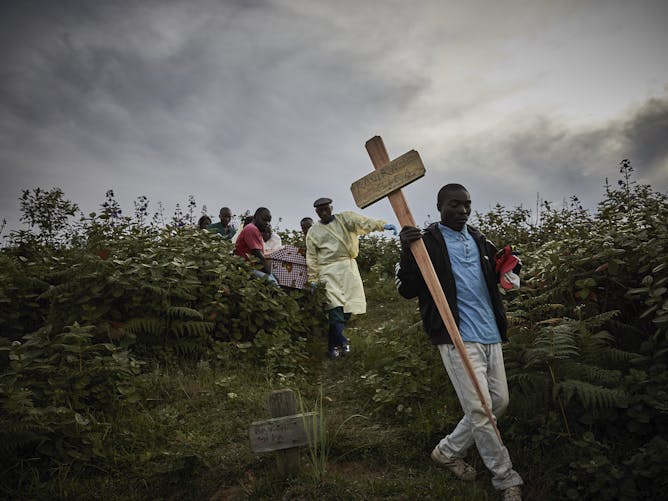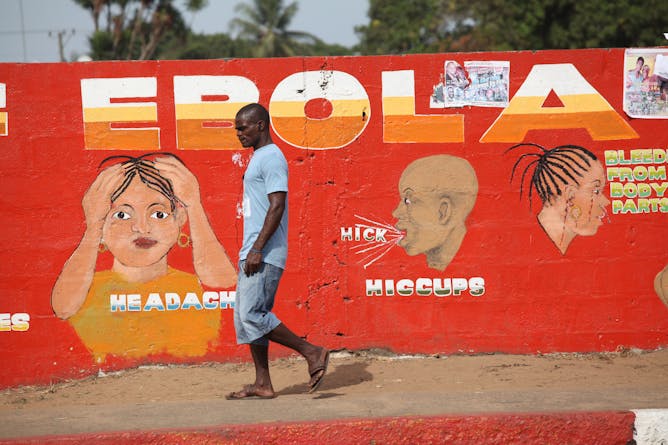|
|
|
Editor's note
|
|
The Ebola crisis in the Democratic Republic of the Congo (DRC) has been rumbling on since April 2018. At the start of the crisis, there was a lot of optimism that it would be swiftly dealt with – including among our authors. After all, this is the DRC’s ninth outbreak. But that spirit rapidly dissipated this week following reports that the disease had spread to neighbouring Uganda. A five-year-old boy, who fled the DRC with his family, was
the first victim.
As Sterghios Moschos points out in a new article, this should never have happened. There is screening at borders (where people with high temperatures are pulled over), effective diagnostic tools that a novice can use, and a highly effective vaccine. Sadly, these things count for little when a civil war is raging and suspicion of healthcare workers is still rife. (Two minutes after we published Sterghios’ article, news came in that a second
person had died of Ebola in Uganda.)
Unlike the current DRC and Uganda outbreak, most outbreaks go undetected. New research suggests that about half of all Ebola outbreaks are small (fewer than five people) and so escape wider attention. The findings highlight the need for more investment in local healthcare and surveillance.
Meanwhile, in the UK, the race for Tory leadership continues apace, with the odds on Boris Johnson to win.
Forest schools are also in the news. A new study suggests that outdoor play has significant benefits for children, including helping them become more emotionally resilient.
|
Clint Witchalls
Health + Medicine Editor
|

|
|
Top stories
|

Burial of Ebola victims in the DRC.
EPA/HUGH KINSELLA CUNNINGHAM
Sterghios Moschos, Northumbria University, Newcastle
Vaccines against Ebola exist, as do diagnostic tests and screening at border crossings. So why is the disease spreading?
|

Most cases go undetected.
AHMED JALLANZO/EPA-EFE
Emma Glennon, University of Cambridge; Freya Jephcott, University of Cambridge
Many cases of Ebola are missed entirely. Affected countries need to invest in primary healthcare and detection to nip outbreaks in the bud.
|

Stefan Rousseau/PA
Tom Quinn, University of Essex
The speed is about to pick up as the field narrows.
|

shutterstock
Janine Coates, Loughborough University; Helena Pimlott-Wilson, Loughborough University
Forest School helps children learn without realising it.
|
Politics + Society
|
-
Christopher Kirkland, York St John University
Brexit will inevitably dominate this campaign, but the next prime minister also needs positions on austerity, party unity and how to actually survive in parliament.
-
Malte Phillipp Kaeding, University of Surrey
Why protests have returned to the streets of Hong Kong.
-
Gerda Reith, University of Glasgow; Erika Langham, CQUniversity Australia; Heather Wardle, London School of Hygiene & Tropical Medicine
Matt Hancock wants a new levy to tackle gambling harms, but it's a lost opportunity unless you spend it the right way.
|
|
Cities
|
-
Emily Lindsay Brown, The Conversation
Academic experts on how the humble car could evolve to become an unlikely hero in the global fight against climate change.
-
Gavin Harper, University of Birmingham; Calvin Jones, Cardiff University
To become an attractive prospect for electric car manufacturers, the UK needs to sort out its supplies of rare earths – Brexit, or no Brexit.
|
|
Arts + Culture
|
-
Annie Sutherland, University of Oxford
Margaret Atwood's handmaid has become a symbol of the subjugation of women. Anchorites were the medieval equivalent: women who were literally bricked up to keep them chaste.
-
Milka Ivanova, Leeds Beckett University; Dorina-Maria Buda, Leeds Beckett University
The HBO series 'Chernobyl' has reignited interest among tourists to visit Pripyat, but growing up in the disaster's shadow has made us wary.
|
|
Science + Technology
|
-
Chris Arridge, Lancaster University
Whether anything could live in Europa's subsurface ocean depends on what kind of salt it contains. Now scientists have found out.
-
Hugh McLachlan, Glasgow Caledonian University
In the future, consciously aware robots could be part of our everyday world, deserving of moral respect and consideration.
|
|
Environment + Energy
|
-
Mathew White, University of Exeter
New research tracked 20,000 people to figure out the ideal 'weekly dose' of nature.
|
|
| |
Featured events
|

|
34 Broad Street, Oxford, Oxfordshire, OX1 3BD, United Kingdom of Great Britain and Northern Ireland — University of Oxford
|

|
King Henry Building, King Henry I Street, Portsmouth, Hampshire, PO1 2DY, United Kingdom of Great Britain and Northern Ireland — University of Portsmouth
|

|
King Henry Building, King Henry I Street, Portsmouth, Hampshire, PO1 2DY, United Kingdom of Great Britain and Northern Ireland — University of Portsmouth
|

|
Bowland Auditorium, Berrick Saul Building, Campus West, York, York, YO10 5DD, United Kingdom of Great Britain and Northern Ireland — University of York
|
|
|
|
| |
| |
| |
| |
| |
|
|
|
|
|
|
|